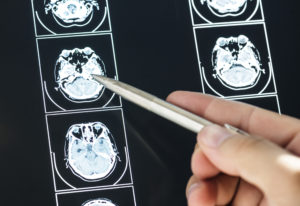

Traumatic Brain Injury
Quick Contact
Call us today at (205) 201-1789 if you have questions about a Traumatic Brain Injury!
Traumatic brain injury is an interference to the brain’s function. It can be caused by a blow, bump, or jolt to the head, where the head violently hits an object or when an object pierces the skull and enters brain tissue. The common causes of traumatic brain injury include falls (ladders, stairs, bathtubs), vehicular collisions (both for drivers and pedestrians), sports injuries (this includes several sports, not limited to football, soccer, boxing, skateboarding, and hockey), explosive blasts and other combat injuries, and other forms of violence like gunshot wounds, domestic violence, child abuse, and assault. Groups most at risk for traumatic brain injury include small children, infants (sometimes involving birth injuries), young adults (particularly those between the age of fifteen and twenty-four), adults aged sixty and older, and males in all age groups. Children are especially prone if they live in an abusive home, with conditions like shaken baby syndrome being one of the leading causes of traumatic brain injury in children. There are three types of traumatic brain injury: mild, moderate, and severe. In mild cases, there are several physical symptoms, including headaches, nausea or vomiting, fatigue, drowsiness, speech difficulties, dizziness and balance problems, blurred vision, ringing in the ears, taste issues, sensitivity to light or sound, and/or changes in the ability to smell. There are additional cognitive issues including loss of consciousness, confusion or disorientation, memory and concentration issues, mood changes, feelings of depression or anxiety, and problems with sleeping. There is some overlap in the physical and cognitive symptoms of moderate and severe cases of traumatic brain injury, only the symptoms are more severe. These include consciousness loss for several minutes to hours, persistent and worsening headaches, repeated vomiting and nausea, seizures, dilation of the pupils, fluid draining from the nose and ears, inability to wake from sleep, weakness in the extremities, coordination problems, confusion, unusual behavior like combativeness or agitation or self-control issues, slurred speech, and the chance of falling into a coma or another form of vegetative state. If you are showing signs or symptoms of traumatic brain injury there are diagnostic options, as well as treatments. For diagnostic purposes, CT scans are your best option, though x-rays and MRIs can show evidence of TBI. For treatment there are surgical and non-surgical options. With mild cases of traumatic brain injury an individual can sometimes be treated with rest and over-the-counter pain medication to relieve the stress, though it is important that they be monitored closely for any developing or worsening symptoms, and to schedule follow-up appointments with a physician. For moderate to severe cases of traumatic brain injury it is important to seek emergency care immediately to have surgery performed. There are several negligent acts associated with traumatic brain injury, and several are vehicle related. Reckless driving leading to automobile accidents, driving under the influence, and lack of seatbelt usage are notable associated acts. Also, not wearing a helmet during the appropriate athletic activities can leave you at risk of traumatic brain injury. There are also instances of medical neglect, as in cases where physicians fail to provide proper care or misdiagnose brain injuries, or the improper administration of anesthesia, or over prescribing medication that leads to neurological damage. Additionally, the workplace can put you at risk for traumatic brain injury. Every workplace has a duty of care and when that is breached (as with slips and falls, falling debris, or other workplace actions) then the employer has been negligent. What is a Traumatic Brain Injury?

Personal Injury
- Bicycle Accident Injury
- Birth Injury
- Car Accidents
- Catastrophic Injuries
- Child Injury
- Construction Accidents
- Defective Drugs
- Defective Products
- Dog Bite Injuries
- Drunk Driving Accidents
- Medical Malpractice
- Mesothelioma
- Motorcycle Accident
- Nursing Home Negligence
- Personal Injury
- Premises Liability
- Sex Abuse & Assault
- Slip & Fall
- Toxic Torts
- Traumatic Brain Injury
- Truck Accidents
- Vehicle Accidents
- Workplace Injuries
- Wrongful Death
Locations
- Alabaster Personal Injury
- Anniston Personal Injury
- Bessemer Personal Injury
- Birmingham Personal Injury
- Decatur Personal Injury
- Huntsville Personal Injury
- Jefferson County Personal Injury
- Leeds Personal Injury
- Madison Personal Injury
- Montgomery Personal Injury
- Pell City Personal Injury
- Shelby County Personal Injury
- Talladega Personal Injury
- Tuscaloosa Personal Injury
Harris Firm LLC Proud Member of

Personal Injury FAQs
Personal injury is any injury sustained from an accident or another incident as a result of someone’s recklessness, negligence, or intentional wrongdoing. These injuries may be psychological or physical in nature... Read more
A person acts negligently when they fail to take all reasonable actions to prevent harm to someone else. If someone is negligent and you are injured as a result, then they are liable for your injuries and you can ... Read more
What your case will be worth depends greatly on the extent of the injury and the nature of the incident. Our injury lawyer can review and examine your case to determine what it may be worth. However, what you end up... Read more
Nothing. We will begin working on your case once you have signed a contract with us and you do not pay us any money up front. We are only paid if we get you an award of damages and receive a percentage... Read more
If your loved one passes away, the remaining family member or representative of the deceased person’s estate can take legal action against the party whose negligence led to the wrongful death. In these scenarios... Read more
